How often do you use encryption? It seems like the stuff of spy films, but you may be surprised to find out how often it touches your daily life.
Encryption is the process of scrambling or enciphering data, and only someone with the key can read or access it. You can use it for things like shopping online, using mobile banking, or using secure messaging apps. So while you might not be smuggling encrypted government secrets across borders, you do rely on it, along with your passwords and settings, to keep your data secure and private.
Learn about all of the ways you use encryption.
07:21
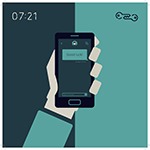
Your alarm vibrates. You reach for your phone, ready to snooze before you think better of it. You’ve got a big presentation at work and you’re going to need every minute today. There’s a message from your friend in Australia wishing you luck. How thoughtful! Even more thoughtful: your friend used an end-to-end encrypted messaging app. Sure, they saved on international phone charges, but the added security is nice, too.
08:13
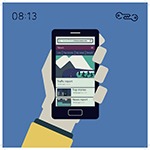
You’re ready to go, but before heading out, you check a news website for the traffic report. There’s a lock icon on the search bar, telling you the site uses HTTPS security, which means it’s harder for anyone to see which articles you’re reading. There’s been a minor accident on your usual route so you decide to take the train.
09:46
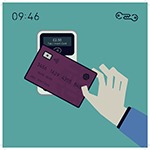
The train is crowded, but you manage to grab a seat. You take a sip of the coffee you purchased at the platform kiosk. When you used your credit card you used three points of encryption: via the credit card’s chip, the credit card reader, and while the credit card info was transmitted to authorize your purchase. But you’re not thinking of that. Instead you slip on your bluetooth headphones and breathe a sigh of relief that no one else can hear your daily affirmations. There’s a reason for that: because you’re good enough, you’re smart enough, and doggone it, encryption!
11:24
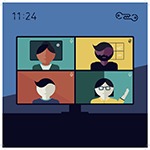
Before you can even settle into your desk at work, you log in to your email account to check on one last thing you need for today’s important presentation. There’s no news, so you hop onto a videoconference call with colleagues across the country to try to get an update. The call is secured by end-to-end encryption, so it’s a lot harder for anyone to listen to your conversation as the data travels from your computer to your colleagues’.
15:14
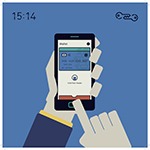
You did it! The presentation went well and now you’re ready for a break. You’re about halfway through that double bacon chili cheeseburger when the pain starts. You use all of your drugstore rewards points to buy heartburn medicine, and make a mental note to eat better. Lucky for you, the store encrypts this information. Hackers can’t easily access your purchase history, so your dietary choices can be your secret.
16:39
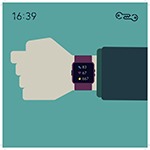
At the end of your work day you glance down at your fitness tracker and see that you’ve walked 8,000 steps. Good job! It almost makes that lunch worth it. Because there’s secure communication between your tracker and its app, you know your health information will stay secure from anyone hacking the free public WiFi you use in the train station. Now you touch your secure pre-paid pass to the gate to head home. You were annoyed a few months before when the transit authority updated their pass system, but the new system uses cryptography to help ensure that a stranger can’t pass their card off as your own – and charge your account.
17:44
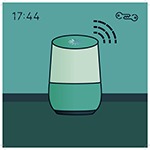
You stop at the grocery store to pick up dinner. Since you’re out of cash, you use an app on your smart phone to pay. Each time you make a payment this way, the transaction data is secured using encryption. You spent the exact price of a deep-dish Buffalo-wing pizza, but your future cardiologist doesn’t need to know that. (It comes with celery sticks. You’re already making healthy choices!)
As soon as you’re home, you beckon your personal digital assistant to turn on the lights. You settle into the couch with dinner and turn on your smart TV to watch your favorite Hallmark movie. You have a weak spot for stories about successful women who return home for the holidays only to fall in love with their childhood sweethearts. Because your WiFi is encrypted, your film snob neighbor never has to know.
Now that you know all the ways encryption keeps your data secure, your mission, should you choose to accept it, is to help protect it.
Take these six actions to protect encryption and protect yourself.


